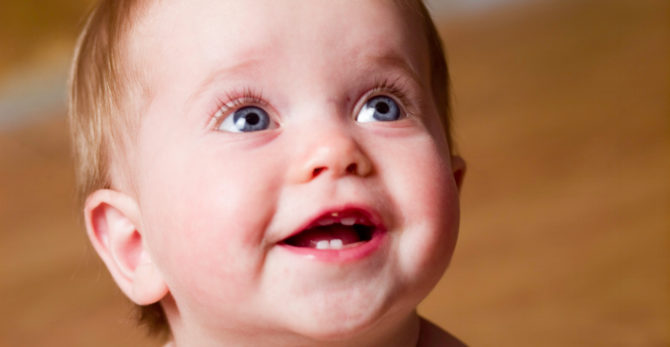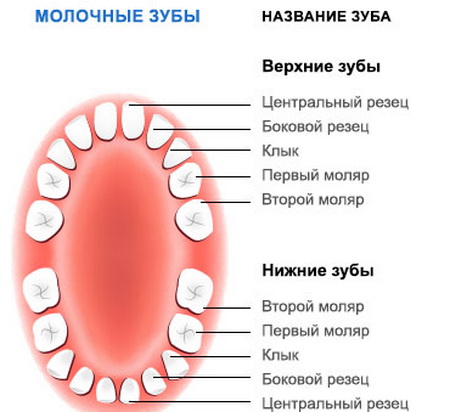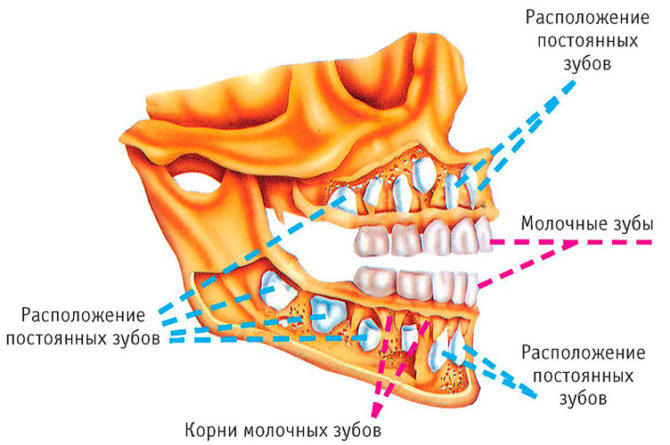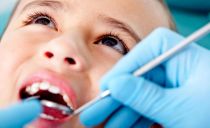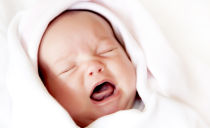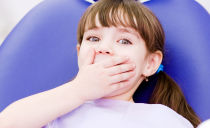How many baby teeth should a child have in 2 years
Teething is a long and very difficult period for both the children themselves and their parents. It is accompanied by periodic moods and poor health. But most importantly, the result is a complete milk row, which is formed by the end of the second year of life. By such a responsible period, each parent should know how many milk teeth children should have at 2 years of age, how to care for them and when to go to a pediatric dentist.
Content
How many teeth should be in 2 years
The process of formation of the milk dentition in accordance with the average data can be tracked according to the table:
| Age | Which teeth erupt |
|---|---|
| 6 months | Incisors (lower central) |
| 8 months | Incisors (upper central) |
| 10 months | Incisors (upper lateral) |
| 1 year | Incisors (lower lateral) |
| 14–16 months | Molar - fourth teeth (lower and upper) |
| 16-18 months | Upper fangs |
| 18–20 months | Lower fangs |
| 20-24 months | Molar - fifth teeth (lower and upper) |
In some tables, later teething can be found - up to 33 months of life. The body of each person develops according to an individual plan, so the time of the appearance of certain teeth in different babies may differ. Customized a 2-year-old child may have 16 to 20 teeth.
The number of teeth that must be present in a child at one age or another can be calculated by the formula. To do this, subtract 4 from the number of lived months. Returning to the table, you can check the calculations: 6 months minus 4 equals two (2 lower incisors), 12 months minus 4 equals 8 (paired lower and upper central and side incisors).
Teething abnormalities
In some children, the number of teeth at 2 years old is not normal, or they erupt in the wrong position. Another alarming symptom in which it is necessary to show the baby to the pediatric dentist is teething of only one tooth from a pair, when the next teeth according to the plan have already appeared. For example, if there is only one fang, and all the molars have already erupted, you should go to the doctor for an examination. The reasons for such deviations can be:
- Bad habits, malnutrition of the mother during pregnancy. Such factors affect the process of laying the rudiments of the teeth. If, due to starvation, vitamin deficiency, the action of toxic substances, the fetus does not form dental primordia, subsequently the corresponding teeth will not be cut out in the child.
- Inadequate nutrition of the mother during lactation and untimely or improper feeding of infants. The development of teeth can be impaired, defects in individual dental tissues are possible.
- Improper bone and dental tissue formation with rickets due to vitamin D deficiency.
- Congenital malformations causing malocclusion.
- Excessive fluorine content in drinking water, which leads to the development of fluorosis - the appearance of spots on enamel.
- Frequent and chronic diseases, endocrine disorders interfere with the normal development of the dentition.
Dental Health Care
By 2 years, the child should have 16–20 teeth. But no matter how many there are, parents should be careful about their health. Regular examinations of the baby's oral cavity will help to identify dental diseases at an early stage of development, if you find violations, you need to contact dentistry. To prevent dental problems, moms and dads should:
- Properly organize the baby's nutrition, try to extend the natural feeding: if the mother has breast milk, you need to feed the baby at least six months. With regular visits to the pediatrician, parents receive recommendations from the doctor on the introduction of complementary foods (vegetable purees, juices, meat soups).
- Time to wean the baby from pacifiers and bottles with nipples, as they spoil the teeth and can cause bottle caries.
- To give the baby not only soft foods and mashed mashed potatoes, but also solid foods. In two years, the child has enough teeth to chew vegetables, fruits. This helps strengthen the emerging dentition.
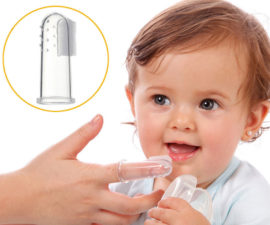 Control the amount of sweets consumed by the child.
Control the amount of sweets consumed by the child.- Brush the teeth of the crumbs with a brush with soft bristles without toothpaste or with special children's paste with a minimum content of harmful impurities. There are also devices for cleaning teeth, which are made of soft silicone - they are put on the finger and clean the baby's mouth.
- Periodically show the child to the pediatric dentist to monitor the condition of the teeth.
- Monitor the quality of water used by the baby. The content of fluorine and other impurities in water should not exceed the norm.
Why caries is dangerous for children
At 2 years old, the teeth should be not only in the required quantity, but also in good condition. Despite the fact that information about the need for oral care is available to almost all modern parents, many of them are not serious enough about this problem.
Some mothers and fathers are in no hurry to lead their 2-year-old baby to the dentist even after detecting signs of caries. It is a common misconception that since milk teeth fall out, their condition does not matter, because in the future a permanent dentition will form in the child. But in fact, carious and other tooth injuries should always be treated, regardless of age. There are several reasons for this:
- With any roughness on the enamel, and even more so in the presence of a carious cavity, it becomes more difficult to brush your teeth. As a result, part of the plaque is not removed, and the place where it remains becomes the focus of infection. Stomatitis, ENT diseases can become more frequent. Microbes that accumulate on the teeth can even infect a child’s internal organs.
- Progressive damage to the tooth can affect its internal part - the pulp. With pulpitis, severe pain appears that cause a 2-year-old baby a lot of suffering.
Dilapidated milk teeth with foci of purulent inflammation can adversely affect the formation of a permanent dentition, the development of the beginnings of new teeth may be impaired.
In case of tooth diseases, the baby may need a filling or surgical treatment - tooth extraction, which should be carried out only if it is impossible to preserve it.
Care for the baby’s teeth should not begin when the first teeth appear, but also during pregnancy. At two years old, the baby should be instilled in hygienic habits so that he takes good care of his oral cavity throughout his life.
Normally, in two years, the child should have 20 teeth. If their number is noticeably behind the norm, or other suspicious symptoms are noticed - damage to the enamel or malocclusion - you should consult a doctor. Periodic examinations by the dentist will help to diagnose dental problems in time and maintain the health of the permanent dentition.

